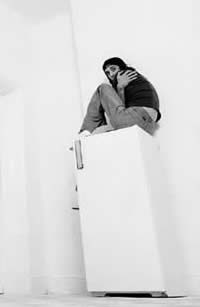

Timeline: 1974
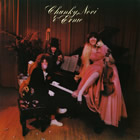
Producing Chunky, Novi and Ernie
Co-produces with Ted Templeman the self-titled Chunky, Novi and Ernie album, an American soft rock trio. Rumour had it that Cale is actually Novi, who is credited for viola, keyboard and backing vocal, but it is actually band member Ilene Novog. He also arranged strings and horns for three tracks: Antique, Italian Sea and America / Chicago.
"The second album I produced on Reprise was a strange classic. Since it's hard to tell where Chucky, Novi and Ernie's origins lie, classifying this album is a problem. It was very Californian, and owed something to Frank Zappa. They even thanked him for providing them with a father image."
Italian Sea is included on the Conflict & Catalysis: Productions & Arrangements 1966-2006 compilation album (2012).
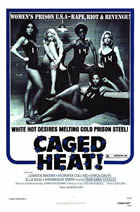
Caged Heat soundtrack
Composes the soundtrack of Caged Heat, the first film by director Jonathan Demme. Also released under the title Renegade Girls.
Performed by Cale with Shuggie Otis on guitar and Pete Ivers on harmonica. Some sources mention Mike Bloomfield on guitar.
Never released officially, but it can be found on the Soundtrax Extrax cassette distributed via the Velvet Underground Appreciation Society in 1985.
Moves to London
Cale moves back to London. While looking for work, he keeps playing his box sets by the Beach Boys and Gustav Mahler.
Island record deal
Signs a contract with Island for six albums in three years. He also works as a talent scout for the label. He would record three studio albums - Fear, Slow Dazzle, and Helen of Troy - before things turned sour after the latter was released when it wasn't finished yet.
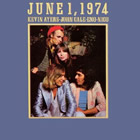
June 1, 1974
On the 1st of June Cale performs with Kevin Ayers, Nico and Brian Eno at the Rainbow Theatre in London. His version of Heartbreak Hotel is the only solo Cale track on the June 1, 1974, album, that is rushed out quickly on June 28. He also played Buffalo Ballet and Gun. Plays viola on Driving Me Backwards (Eno) and Two Goes Into Four (Ayers), and piano op Baby's On Fire (Eno).
The encore I've Got A Hard-On For You Baby by Kevin Ayers has Cale joining in with the chorus. Yes, Mr. Ayers is "the bugger in the short sleeves" who had fucked his then wife Cindy Wells the night before the concert. Her faux pas was immortalized by Cale in Guts on Slow Dazzle
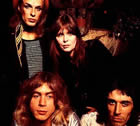
"My first appearance on an Island recording was on an LP made from a concert which took place at London's now defunct Rainbow Theatre on 1 June 1974; the date became the album's title. I was actually one-fourth of the featured band—the others were the former Soft Machine guitarist Kevin Ayers, who had invited everyone to guest at what started at his own concert, the former Roxy Music musician Brian Eno, and Nico... This was the first time I had gone on stage on my own. And to me it was so important it was nerve-racking... The night before the concert Kevin and Cindy got together. That did it for me. She lied about it, but in the end I was able to go to Kevin and say, 'Look, as a gentleman, tell me, did such and such happen?' Kevin said, 'Yes.' I went back to Cindy and said 'Look, you fuck!' and things just got worse and worse."
Brian Eno on the concert:
"[John Cale] did a really interesting version of Heartbreak Hotel, in a minor key. It's incredibly suicidal. I mean you could never believe that that song could turn out to be such a downer as that... Nico did Deutschland Über Alles, which was very good... and she did The End by The Doors, which is the one they put on the album... Nico doing The End was so chilling, it really was. It was incredible. She invests it with so many levels of meaning I didn't hear in The Doors' one. She underplays it... there's just the harmonium, me playing synthesizer — almost doubling the harmonium part — and her singing... which is just like a rich, kind of non-specific miasma of sound...""
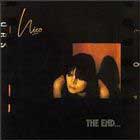
Producing "The End"
In the Summer Cale plays twelve instruments - organ, synthesizer, bass, guitar, percussion, piano, glockenspiel, keyboards, marimba, triangle, xylophone, cabasa - and produces Nico's The End album. The recordings took place at Sound Techniques studio in London. Her label Island promoted the release in November with the tacky tagline: "Why waste time cvmmitting suicide when you could buy this album?"
"She cried when it was finished. She did that with the others too."
Her label Island promoted the release in November with the tacky tagline: "Why waste time cvmmitting suicide when you could buy this album?" To which Cale quipped:"You can't sell suicide".
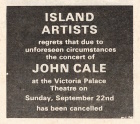
No show with St. Paul's Cathedral Boy's Choir
A show at the Victoria Palace Theatre in London on September 22 is cancelled due to "unforeseen circumstances". He would have been joined by St. Paul's Cathedral Boy's Choir.

Fear
In October 1 the classic Fear album is released on Island Records. The record company sends out a special edition to the press: Hear Fear.
"The recording of Fear was interrupted by the June 1st concert. That concert was put together by Richard Williams and Island Records. They had all these cult people on the label. The idea was that if you put them all together you might sell enough to justify their presence.
Anyway we were all sitting in the studio, Brian Eno was running around the kitchen making coffee 'cause Chrissy (Hynde) said "somebody had to be domestic around here". I was downstairs working on arrangements when in jumps Doug McClure from the tv series The Virginian.
I couldn't figure out what he was doing. He said it was his birthday so he was running around London---running down alleyways, i guess, 'cause our studio was in a real cul de sac. Everything stopped again; nobody could figure out what the hell he was doing there!
Most of Fear was done with the band on June 1st 1974. Eno used to carry his synthesizer around in a little briefcase. For Momamma Scuba we had so many people in the studio that we were running out of mikes. The density on the track was so great that we had no power left. We had a ton of guitars, but you'd never know it because they are all so diffused."
Mick Gold of UK monthly Let It Rock loved the album:
"Cale has the voice of a chameleon. It's never great singing but his deadpan Welsh-American accent gives it just the right edge. His music has broadened its range whilst also sounding more pared-down. And at least five songs on this album stand equal to the best songs of the 70s. I think it's self-evident from Paris and Fear that Cale's work is more original and more enjoyable than the albums being put out by a dozen better-known artists."
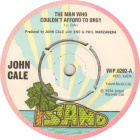
The Man Who Couldn't Afford To Orgy single
The Man Who Couldn't Afford To Orgy is released as a single in November, with the non-album track Sylvia Said (which would be released on the compilation albums Guts, The Island Years and Gold) as the B-side.
A near riot in West-Berlin
A show with Eno and Nico at the Nationalgalerie in West-Berlin on October 5 causes a near riot when the threesome embark on a full version of the German national anthem Das Lied Der Deutschen. The two first verses were considered as tainted after World War II. Richard Thomas, an English music journalist was there and posted this on his blog:
"The idea was to split the evening between the songs of Cale and Nico. She sang "Frozen Warnings" and "No One Is There" from The Marble Index, "Janitor of Lunacy", "The Falconer", "Mutterlein" and "Abschied" from Desertshore, and three tracks from her new album: "You Forgot to Answer", "Innocent and Vain" and the title track, the Doors' "The End". He performed "Guts", "A Child's Christmas in Wales", "Buffalo Ballet", Lou Reed's "I'm Waiting for the Man" and "Fear", the title track of his new album.
For me, "Fear" was the real first high-point, not least because the point of the card table and the amplified water-filled wine glasses became apparent. Eno tapped on the glasses to make tintinnabulatory noises and then, as Cale's dramatic song neared the point of explosion, he started to smash them. Fluxus had come to the Bauhaus.
But that was just a start. A certain amount of restiveness had been apparent in the audience from the start, in the form of mild heckling and booing. Back then Berlin audiences had a marked tendency to make their feelings known, and - given that 1974 was the time of the Andreas Baader, Ulrike Meinhoff and the Red Army Fraction - this lot probably spent as much time at political demonstrations as at concerts.
What really set them off was Nico's decision to sing "Das Lied der Deutschen", the old national anthem, with its tune by Haydn and its triumphalist words by August Hoffman von Fallersleben. It had been readopted by the Bonn government in 1952, using only the third verse: a hymn to peaceful unification. The verses about "Germany above all in the world" and "German women, Germany loyalty, German wine and German song" were omitted. Nico, inevitably, ploughed her way through the lot, seemingly oblivious to the gathering crescendo of disapproval. Cale responded as one knew he would, by hammering Rachmaninoff-style arpeggios up and down the keyboard, while Eno gamely produced a variety of lurid war noises from his little synthesiser. The booing and the heckling became shouting and chanting, and dozens of the white polystyrene cushions were hurled (quite harmlessly) towards the stage.
As the cushions flew through the spotlights in the darkened space amid that anarchic din, with Nico imperturbable at the centre of the storm, you could not help but think of the events of 30 years earlier, and what she must have witnessed as a small child. I never knew what her motivation for performing that song was, and I never felt like asking."